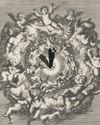
Among the pedestaled titans of Western music, George Frideric Handel was the first composer whose work not only quickly became celebrated in his own time but has been heralded ever since. Before Handel, no real "repertoire" of enduring music had existed. Composers were considered craftsmen in an evanescent art, their creations regularly superseded by fresher work. Most music that got performed was relatively new. Claudio Monteverdi, the preeminent European composer of the early 17th century, was largely forgotten within decades of his death, in 1643. Johann Sebastian Bach amounted to hardly more than a cult figure after he died, in 1750, his major works unplayed well into the next century.
When Handel died, at 74 in 1759, he was already well fortified for posterity. A celebrity since his 20s, he had been the subject of grand portraits and was depicted as Orpheus in a 1738 statue in London's Vauxhall Gardens. Whereas Bach earned an unmarked grave in Leipzig and one obituary four years after he died, Handel was buried in Westminster Abbey.
Handel stands apart in another way from the musical giants who have since been rediscovered and enshrined: Each of them is renowned for an array of oftenperformed pieces. His stature is owed above all to a single work-the oratorio Messiah.
Among the towering masterpieces of Western music, the Messiah occupies a distinctive place: It is familiar to more people than any other work of its kind. Bach's B Minor Mass and St. Matthew Passion and Monteverdi's Vespers are comparable among supreme choral pieces, but they aren't performed at your church or the high school down the street. The Messiah often is, trotted out during the Christmas season by amateur and professional choruses around the globe. A fair percentage of the world probably knows the "Hallelujah" chorus well enough to sing along.
This story is from the December 2024 edition of The Atlantic.
Start your 7-day Magzter GOLD free trial to access thousands of curated premium stories, and 9,000+ magazines and newspapers.
Already a subscriber ? Sign In
This story is from the December 2024 edition of The Atlantic.
Start your 7-day Magzter GOLD free trial to access thousands of curated premium stories, and 9,000+ magazines and newspapers.
Already a subscriber? Sign In

Apocalypse, Constantly
Humans love to imagine their own demise.

A Palestinian American Sex and the City
Betty Shamieh's debut novel is a rebellious rom-com.

Modi's Failure
Why India is losing faith in its strongman leader

The Anti-Social Century
Americans are now spending more time alone than ever. It's changing our personalities, our politics, and even our relationship to reality.

The Wild Charity of Saint Francis
The guide we need, now that kindness is countercultural

Where Han Kang's Nightmares Come From
In her novels, the South Korean Nobel laureate returns again and again to her countrys bloody past.

TROPHY HUNTERS
A GROUP OF CHILDHOOD FRIENDS PULLED OFF A STRING OF THE MOST AUDACIOUS SPORTS-MEMORABILIA HEISTS IN AMERICAN HISTORY. THEN THEY DID SOMETHING REALLY CRAZY.

THE NEW RASPUTINS
Anti-science mysticism is enabling autocracy around the globe.

ARMY OF GOD
AMERICAN CHRISTIANS ARE EMBRACING A CHARISMATIC MOVEMENT KNOWN AS THE NEW APOSTOLIC REFORMATION, WHICH SEEKS TO DESTROY THE SECULAR STATE. Now THEIR WAR BEGINS.

WHAT NOT TO WEAR
The false promise of seasonal-color analysis